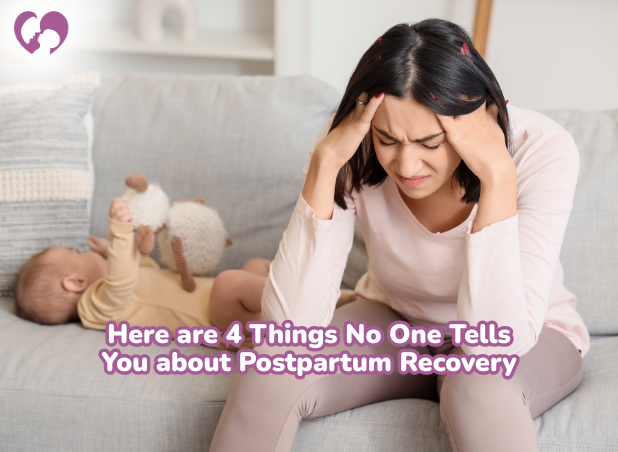When mummies first heard about postpartum recovery, they thought confinement experience is like: resting for a month, eating warming foods, avoiding cold water, and letting body heal. While the basic concepts are widely discussed, there are deeper realities about this recovery period that many new mothers discover only after experiencing them firsthand.
Understanding these lesser-known aspects can help you prepare more effectively and set realistic expectations for your postpartum journey. Let’s explore four important truths about postpartum recovery:
1. Postpartum Emotional Challenges

What Nobody Warns You About
You know how everyone talks about the physical recovery after birth? Well, here’s what they don’t tell you: the emotional recovery can be just as intense, if not more so. The reality is that your hormonal system undergoes dramatic shifts after birth that can create an emotional experience unlike anything you’ve encountered before.
This isn’t just “baby blues,” it’s your entire hormonal system doing a complete 180. Think about it: your body spent nine months ramping up pregnancy hormones, and now they’re crashing down while new ones, breastfeeding hormones are kicking in. It’s like your emotional thermostat is broken and stuck on “intense.”
What You Might Actually Feel
Many new mothers are surprised by the intensity and unpredictability of postpartum emotions. You might experience:
- Sudden mood changes that seem disproportionate to the situation
- Anxiety about your baby’s wellbeing or your parenting abilities
- Unexpected feelings of loss or grief for your pre-baby life
- Difficulty feeling immediately connected to your baby
- Overwhelming feelings of responsibility or inadequacy
Here’s What Actually Helps
Forget the “just think positive” advice. Here’s what really works:
Talk to someone every single day. Even if it’s just a five-minute phone call with your sister or a text conversation with a friend. Isolation makes everything worse.
Lower your expectations. Focus on basic needs like feeding yourself and your baby, getting some rest, and basic hygiene. Everything else is optional.
Remember this is temporary. I know it doesn’t feel like it when you’re in the thick of it, but these intense emotions do level out as your hormones stabilize.
Know when to seek help. If feelings become overwhelming or interfere with daily functioning, professional support can be invaluable.
2. Your Body Actually Benefits from Gentle Movement

Rest is important, but it will better if you have some movement
Traditional confinement advice often emphasizes staying in bed and avoiding all physical activity. However, modern research shows that while adequate rest is crucial, some gentle movement can actually support your recovery process rather than hinder it.
The key is understanding the difference between rest and complete inactivity. Your body needs time to heal, but it also needs gentle exercises to help in healing. (Be careful not to overdo it)
Why Your Body Needs Gentle Movement
Think of it this way: when you break your arm, the doctor doesn’t tell you to never move it again. They give you specific exercises to help it heal stronger. Your postpartum body works the same way.
Here’s what gentle movement actually does for your postpartum recovery:
- Promotes blood flow, which is essential for healing and reducing the risk of blood clots, especially after a C-section.
- Helps strengthening muscles by rebuilding strength and stability
- Improves your mood naturally (combat baby blues and postpartum depression)
- Gives you better sleep when you do rest
- Helps with digestion and reduces constipation
What Gentle Movement in Postpartum Actually Looks Like
It prioritizes movements that engage the pelvic floor and core. Here are some examples of gentle movement:
- Simple breathing exercise
- Pelvic tilts
- Knee rolls
- Gentle stretches
- Walking
- Classes like postpartum yoga, pilates, etc
Note: Please consult with your doctor or pelvic floor specialist before starting any exercise program.
3. Many Traditional Practices Aren’t Based on Scientific Evidence

Different cultures have their own rules about what new mothers should and shouldn’t do after giving birth. Many of these traditions are helpful and make sense for recovery, but some aren’t backed up by medical research. That doesn’t mean they’re bad for you – it just means you should know which pieces of advice are proven by science so you can decide what’s best for your own recovery.
Take the “no cold water” rule, for example. I spent my entire first confinement drinking only warm water, even when I was desperately thirsty and it was 90 degrees outside. Later, I learned there’s no scientific evidence that cold water harms postpartum recovery. In fact, staying properly hydrated (with whatever temperature water you prefer) is crucial for healing and breastfeeding.
Common Rules vs. What Science Says
Let me share what I’ve learned about some common confinement practices:
Hydration restrictions: Some traditions discourage drinking cold water or recommend only warm beverages. However, proper hydration is essential for healing and breastfeeding, and there’s no scientific evidence that water temperature affects recovery. While traditional practices may be outdated, emphasis on warm drinks during confinement is still relevant as it can be comforting and beneficial for new mothers.
Exposure to wind: Some traditional Chinese confinement practices recommend avoiding any exposure to wind, including fans and air conditioning, due to the belief that it can cause “wind” to enter the body. However, in Singapore’s weather, using fan and air conditioning in moderation to regulate temperature and prevent overheating.
Specific food restrictions: While good nutrition is vital, many specific food taboos aren’t backed by science. Focus on eating a balanced diet that helps you heal and has enough calories if you’re breastfeeding.
4. Your Pelvic Floor Recovery Is a Long Game

The Recovery Timeline Nobody Mentions
Perhaps the most under-discussed aspect of postpartum recovery is the extended timeline for complete pelvic floor healing. Pelvic floor recovery takes way longer than anyone tells you. Like, way longer. I’m talking months, not weeks, especially if you’re breastfeeding.
During pregnancy and birth, your pelvic floor muscles go through incredible changes. Then, if you’re breastfeeding, your estrogen levels stay low, which affects how these muscles heal and function. The recovery process is influenced by multiple factors including hormonal changes, the type of delivery you had, and individual healing patterns.
Understanding the Recovery Process
Immediate postpartum (0-6 weeks): Your pelvic floor is in the acute healing phase. This is a time for rest, bonding with the baby, and gentle healing.
Early recovery (6 weeks-3 months): Basic healing occurs, but your muscles are still regaining strength and coordination.
Extended recovery (3-12 months): If you’re breastfeeding, low estrogen levels continue to affect tissue strength and elasticity, prolonging the recovery process.
Complete recovery (6 months-2 years): Full pelvic floor function may not return until well after your confinement period, and for some women, professional intervention may be needed.
Supporting Your Pelvic Floor During Confinement
Here’s what actually helps (and what I wish I’d known earlier):
Start pelvic floor exercises early, but gently. Think of it like physical therapy for muscles that have been through trauma.
Don’t rush back to high-impact activities. Just because you feel okay walking doesn’t mean you’re ready for jumping or running.
Consider seeing a pelvic floor physiotherapist. This was a game-changer for me during my second recovery. They can assess your specific situation and give you targeted exercises.
Be patient with your body. This is probably the hardest part, but your pelvic floor recovery is a marathon, not a sprint.
Finding the Right Confinement Support for Your Journey

Choosing the right support for your confinement recovery can feel overwhelming, especially when you’re already dealing with pregnancy fatigue or early postpartum recovery. The ideal confinement care provider should understand both the traditional wisdom of confinement practices and modern health recommendations, creating a balanced approach that honors your cultural preferences while supporting evidence-based recovery.
Look for services that offer:
- Experienced confinement nannies trained in both newborn care and postpartum recovery
- Flexible care options that can adapt to your family’s specific needs and schedule
- Cultural sensitivity and understanding of different confinement traditions
- Integration of traditional practices with modern health knowledge
- Comprehensive support covering meal preparation, household assistance, and recovery guidance
Services like Confinement Angels specialize in providing this type of holistic confinement support, connecting new mothers with experienced caregivers who understand the delicate balance between honoring cultural traditions and supporting optimal health outcomes. Their approach recognizes that every mother’s recovery journey is unique and requires personalized care that adapts to individual needs, cultural backgrounds, and family circumstances.
The Bottom Line
Postpartum recovery is unpredictable, and nothing like the peaceful, blissful period some people make it sound like. But it’s also temporary, and you’re stronger than you think you are.
The most important thing I can tell you is this: there’s no perfect way to do confinement recovery. Some days you’ll nail it, other days you’ll feel like you’re failing at everything. Both are normal, and both are okay.
Be kind to yourself during this time. Your body just did something incredible, and now it’s doing the equally incredible work of healing and adapting to your new life. That deserves patience, compassion, and realistic expectations.
Remember, you don’t have to figure it all out at once. Take it one day at a time, trust your instincts, and don’t be afraid to ask for help when you need it. You’ve got this, mama.
Every woman’s recovery experience is unique. This article shares general insights and personal experiences but shouldn’t replace professional medical advice. Always consult with your healthcare provider about your specific recovery needs. If you need a postpartum support during confinement, consult with Confinement Angels today.







